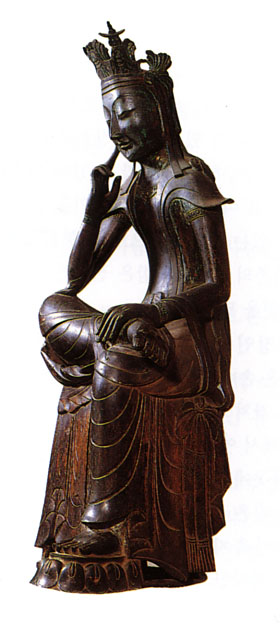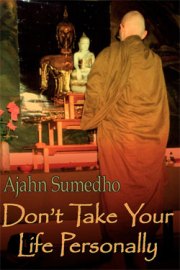 The Four Stages (stream-entry, once-return, non-return and arahant) as described in the Pali Canon are reflective teachings aimed at getting perspective on our own experience. They are not positions. It isn’t a question of thinking in terms of becoming a stream-enterer or becoming an arahant, or wondering, ‘Have I attained stream-entry yet? Am I a non-returner? Will I ever become an arahant?’ This is the worldly mind grasping the concepts. Sometimes you hear people say, ‘This monk ― he’s a stream-enterer!’ and everyone goes ‘Ohhh! a stream-enterer!’ ‘And that one’s an arahant.’ ‘Wow, an arahant!’ (that’s like superman). But the Pali Canon refers to these Four Stages in connection with the Ten Fetters, these Ten Fetters which I have found to be a very valuable reference point in relation to the Four Stages. The point is, it is easy to conceptualize stream-entry as some kind of attainment. The ego grasps the concept and the Western ego in particular tends to want to become what it grasps, looking upon such things as kind of achievements or goals. If you have invested many years as a monk practising meditation, you want something to prove it has been worth it, you know! ‘Give me a title. After all these years I don’t know whether I’m a stream-enterer, or not!’ It is by investigating and recognizing the first three of the Ten Fetters, however, that you come to recognize stream-entry, and stream-entry is the path.
The Four Stages (stream-entry, once-return, non-return and arahant) as described in the Pali Canon are reflective teachings aimed at getting perspective on our own experience. They are not positions. It isn’t a question of thinking in terms of becoming a stream-enterer or becoming an arahant, or wondering, ‘Have I attained stream-entry yet? Am I a non-returner? Will I ever become an arahant?’ This is the worldly mind grasping the concepts. Sometimes you hear people say, ‘This monk ― he’s a stream-enterer!’ and everyone goes ‘Ohhh! a stream-enterer!’ ‘And that one’s an arahant.’ ‘Wow, an arahant!’ (that’s like superman). But the Pali Canon refers to these Four Stages in connection with the Ten Fetters, these Ten Fetters which I have found to be a very valuable reference point in relation to the Four Stages. The point is, it is easy to conceptualize stream-entry as some kind of attainment. The ego grasps the concept and the Western ego in particular tends to want to become what it grasps, looking upon such things as kind of achievements or goals. If you have invested many years as a monk practising meditation, you want something to prove it has been worth it, you know! ‘Give me a title. After all these years I don’t know whether I’m a stream-enterer, or not!’ It is by investigating and recognizing the first three of the Ten Fetters, however, that you come to recognize stream-entry, and stream-entry is the path.
From Don’t Take Your Life Personally, a new book in which Ajahn Sumedho urges us to trust in awareness and find out for ourselves what it is to experience genuine liberation from mental anguish and suffering, just as the Buddha himself did two and a half thousand years ago.
Paperback, 420pp. ISBN 9780946672318
Buddhist Publishing Group
Other posts by Ajahn Sumedho
Categories: Ajahn Sumedho, Books, Buddhist, Buddhist meditation, Encyclopedia, Foundations, Theravada


At the Jatakas we see, at the end of each one, the Master say that the people achieve such way and fruit, stream entry, once return, non return, arhat and so the ways & fruits looks a prosaic achievement as from hearing the Dharma. The four nobles trues about suffering, unsatisfaction, is too near the four ways & fruits, with the knowledge and the act of stop the process in question. The taste of fruits.
Good statement, ‘Do away with the concepts and be one with experience.’
To view the practice as hard is grasping. It is what it is. If we experience the practice as hard isn’t it because we are trying to achieve something? Notice the grasping, the aversion, moment to moment and notice the desire to achieve and stay with the experience whatever it might be. Easy, hard are concepts. Do away with concepts and be one with the experience, with Metta.
I don’t know anything about Buddhism and I am just now taking interest in it, but it seems that I may already do this. Every experience I have, I find the lesson I needed to learn. Is this somewhat the same? Every lesson I have learned has brought me to be the woman I am today. I do see the suffering, but I try not to view it as a bad thing but something I needed to bring me to becoming a better person.
🙏 Meredith,
😀 I think this is the true meaning of the saying ‘when the student is ready the teacher will appear’.
The problem is we think the teacher must be a person, not everyday events.
R
Would you say that these stages are still something we should at least try to attain or strive towards. Too often I hear people saying not to bother, it is too hard. Be good, give to the monks and do lots of chanting. Vipassana meditation is seen as too difficult and since the chances of stream entry are apparently to lofty to even consider many people here in Thailand don’t bother with it at all.
With metta, Phra Greg Chuntawongso
Sound like you have answered your own question.
R
Phra Greg, I think you are missing the Ajahn’s subtlety. The point is that “me” as a personality can not become enlightened. But you can be this awareness. Focus on becoming the knower, not this person who knows.
You might find stream enterers or even once returners in lay people, only few, but possible. They do look human like all of us. These partly enlightened souls may not choose to be in the monkhood in this lifetime at all. They may have been in the monkhood in their previous incarnation(s). They only have one way to go: towards arahantship in future incarnation(s).
Cheers Quang,
As Bodhidharma said:
Mind doesn’t appear as a monk or a layman, an elder or a novice, a sage or a fool, a Buddha or a mortal.
R